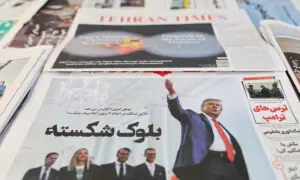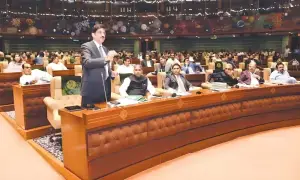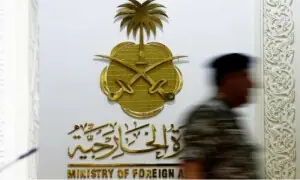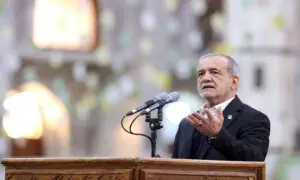IHC restores Nawaz’s appeals against conviction in Al-Azizia, Avenfield references
4 min readA special division bench of the Islamabad High Court restored on Thursday former prime minister Nawaz Sharif’s appeals against his conviction in Al-Azizia Mills and Avenfield references.
A bench consisting of Chief Justice Islamabad High Court Amir Farooq and Justice Mian Gul Hasan Aurangzeb heard the pleas.
The court decision would allow Sharif to contest his sentences in the appeals, which have been pending since his convictions in two corruption cases after his ouster as premier in 2017.
Nawaz Sharif along with his daughter Maryam Nawaz and party leader Marriyum Aurangzeb arrived at the court.
The hearing on the security bail request of Nawaz was also heard. His protective bail was extended on October 24 till Thursday. The bench heard all the petitions together.
On behalf of Nawaz, Amjad Parvez Advocate and Azam Nazir Tarar appeared in the court while the NAB prosecutor general also came to the court along with the prosecution team.
The NAB prosecutor general came to the rostrum and said that there was scope for withdrawing the reference only if the decision had not been delivered. “We have studied the facts and law of both the appeals.”
Nawaz had last appeared in court on Tuesday and surrendered to get an extension in his protective bail. But his appeals in the two cases, in which he was convicted, were not restored immediately.
Nawaz returned to Pakistan on Saturday after nearly four years in exile after getting protective bail from the high court in the two cases.
In reaction to the development, PML-N spokesperson Marriyum Aurangzeb said that progress has been made towards the “end of the injustice” of which Pakistan was a victim for the last seven years.
The PML-N has for long claimed that it was allegedly a victim of “political engineering” in 2017 when courts barred their party’s top leader from holding public office and sentenced him to jail in two cases. They described the bail given to him as “redress” rather than a relief.
“As soon as this injustice ends, Pakistan will again start moving towards development and prosperity, which started under the leadership of Nawaz Sharif, God willing,” she wrote on X.
Avenfield, Al-Azizia cases
The PML-N supremo was awarded 10 years in jail in the Avenfield properties corruption reference for owning assets beyond known income and one year for not cooperating with the NAB, which was to be served concurrently, in July 2018.
The development had come a year after the Supreme Court disqualified him from holding public office in a decision on the Panama Papers case.
Moreover, the Al-Azizia Steel Mills corruption reference was related to the case in which he was sentenced to seven years in jail on Dec 24, 2018. He was later taken to Rawalpindi’s Adiala Jail, from where he was shifted to Lahore’s Kot Lakhpat jail. He was also fined Rs1.5 billion and $25 million in the case.
In March 2019, he was released from jail. Five months later, he went to London after the Lahore High Court granted him the permission on medical grounds. It merits here to mention that the IHC had declared him a proclaimed offender in both cases in December 2020.
For nearly four years, the PML-N supremo stayed in London. Many described it as a self-imposed exile. He returned to Pakistan on October 21, 2023, with plans to have a political comeback. He was granted bail in both cases till October 26 (today).
PML-N supremo Nawaz Sharif
The 73-year-old politician, with a fortune earned in the steel business, is widely believed to have continued pulling the strings of his Pakistan Muslim League-Nawaz party, even after his brother Shehbaz led them to power last year in a coalition ousting Imran Khan.
Nawaz, one of the nation’s wealthiest men, first took power in 1990, but was forced out three years later by corruption allegations – a theme that has dogged his career.
He has lived for years in Saudi Arabia and London – where the Sharif family have extensive luxury properties – only to return to Pakistan each time with renewed zeal.
Stung by the nationalisation of the family steel business – which he later regained control of – Sharif is a fiscal conservative and champion of economic liberalisation and free markets.
He oversaw the privatisation of several key state enterprises – including banks and energy producers – in a process critics say was riven by corruption.
He was also one of the key drivers of the $60 billion China-Pakistan Economic Corridor (CPEC) that underpins relations between Islamabad and Beijing.
During his various stints as premier he was accused of stacking courts with loyalist judges, tinkering with the Constitution, and rigging provincial elections to shore up his party’s power bases.
(With input from AFP)
For the latest news, follow us on Twitter @Aaj_Urdu. We are also on Facebook, Instagram and YouTube.























Comments are closed on this story.